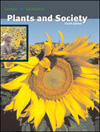

 Plants and Society, 4/e Materials: Cloth, Paper, and Wood Concept Quiz |
 2006 McGraw-Hill Higher Education
2006 McGraw-Hill Higher EducationAny use is subject to the Terms of Use and Privacy Policy.
McGraw-Hill Higher Education is one of the many fine businesses of The McGraw-Hill Companies.